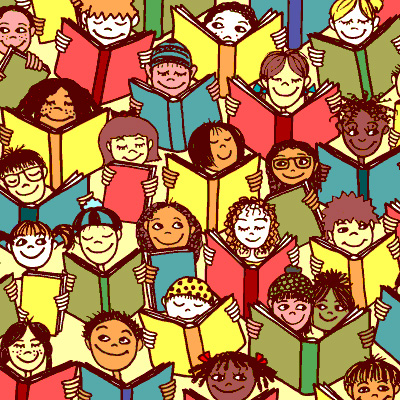Getting Book Rich | Editorial

llustration from Thinkstock/SLJ
Some problems are so persistent and complex that only a whole new approach can break open the potential for a solution. That may just be the case with so-called book deserts, where reading materials are so scarce as to be nearly impossible to find. The recently announced national Book-Rich Environment Initiative promises to be a critical step toward that much-needed new perspective on this intractable problem—with libraries as key partners in the coalition.
As SLJ’s Christina Vercelletto reports, the initiative aims to get books into settings where they are much too rare. The U.S. Department of Housing and Urban Development (HUD) is a key partner; the focus is on families living in HUD-assisted housing. Working in tandem, the National Book Foundation (NBF), the U.S. Department of Education, the Campaign for Grade-Level Reading, and the Urban Libraries Council will look first to deploy a program in 35 communities across the United States. The concept includes distribution of free books, with major donations from Penguin Random House, Hachette Book Group, and Macmillan Publishers, as well as programming designed to engage those families with books over time. Kudos to them all, as well as to Lisa Lucas, who joined the NBF as executive director just over a year ago, for applying a broader meaning to the word “national” in that organization’s name. While the details are still being finalized, and localized factors will inform the particular response in each setting, the promise is significant.
To get a more robust picture of the challenging realities at work in these communities, it’s useful to dig into a 2016 study by Susan B. Neuman and Naomi Moland, “Book Deserts: The Consequences of Income Segregation on Children’s Access to Print” (Urban Education). The researchers went deep in six urban areas, looking at the relative availability of print books for sale for those living in poverty or near poverty versus those living in borderline or middle-income neighborhoods. The findings are stark, confirming that the disparity is real. In the worst circumstance, the researchers discovered that one book would have to be shared by 830 children. In the best of the low-income settings they studied, there was still only one book per child available. “Dividing the total number of children’s books we found for sale by the total number of children in our neighborhoods,” they write, “we found that overall, our borderline and middle-income neighborhoods had 16 times as many books per children than our lower income neighborhoods.”
That’s a far cry from the book-rich environment needed to really support children’s learning. Neuman and Moland cite the 2012 Progress in International Reading Literacy Study of 15,000 children across 49 countries, which found that the “presence of children[’s] books in the home strongly predicts reading achievement, with the average reading achievement difference between students from homes with many children’s books (more than 100) and those from homes with few children’s books (10 or fewer) being very large (91 score points).” Disparity, indeed.
Although Neuman and Moland acknowledge libraries as important assets, they note that they can’t be a single-source solution because of varying hours and offerings depending on funding and capacity. Fines for overdue books, or even the threat of them, can be a deterrent for families in need of library services.
Nonetheless, and smartly, libraries are a critical infrastructure asset at work in realizing the goals of the Book-Rich Environment Initiative. To make the essential impact that is so needed, those worthy goals deserve our attention, support, and ongoing commitment to bringing the riches of books to every community.

Rebecca T. Miller Editor-in-Chief rmiller@mediasourceinc.com
RELATED
The job outlook in 2030: Librarians will be in demand
The job outlook in 2030: Librarians will be in demand
ALREADY A SUBSCRIBER? LOG IN
We are currently offering this content for free. Sign up now to activate your personal profile, where you can save articles for future viewing






Add Comment :-
Comment Policy:
Comment should not be empty !!!
Linda
your<a href="www.booksandbooks.com/" book is very nicePosted : Apr 11, 2017 02:50